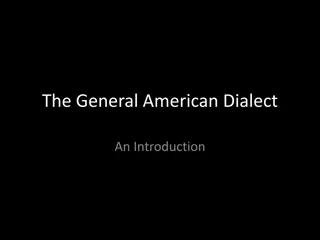Evolution of American English Vocabulary and Language Features
American English exhibits arachaic features and early changes in vocabulary due to colonial influences and the distinct political and administrative system. The language has preserved old-fashioned elements from the seventeenth and eighteenth centuries, while also incorporating new words inspired by Native American and other languages. This linguistic evolution reflects the unique history and identity of American English.
Download Presentation

Please find below an Image/Link to download the presentation.
The content on the website is provided AS IS for your information and personal use only. It may not be sold, licensed, or shared on other websites without obtaining consent from the author.If you encounter any issues during the download, it is possible that the publisher has removed the file from their server.
You are allowed to download the files provided on this website for personal or commercial use, subject to the condition that they are used lawfully. All files are the property of their respective owners.
The content on the website is provided AS IS for your information and personal use only. It may not be sold, licensed, or shared on other websites without obtaining consent from the author.
E N D
Presentation Transcript
Features of American English Archaic Features in American English Early Changes in the Vocabulary
Archaic Features in American English A first quality often attributed to American English is archaism. American pronunciation as compared with that of London is somewhat old-fashioned. It has qualities that were characteristic of English speech in the seventeenth and eighteenth centuries. The American use of gotten in place of got as the past participle of get always impresses the British of today as an old-fashioned feature not to be expected in the speech of a people that prides itself on being up-to-date. American English has kept a number of old words or old uses of words no longer used in Britain.
Early Changes in the Vocabulary When colonists settle in a new country they find the resources of their language constantly taxed. Accordingly, in a colonial language changes of vocabulary take place almost from the moment the first settlers arrive. When the colonists from England became acquainted with the physical features of this continent they seem to have been impressed particularly by its mountains and forests, so much larger and more impressive than any in England, and the result was a whole series of new words like bluff, foothill, notch, gap, divide, watershed, clearing, and underbrush. The names for some of these the colonists learned from Native Americans. Tree names such as the hickory and live oak, and the locust are new to colonial English, as are sweet potato, eggplant, squash, persimmon, pecan.
The individual character of our political and administrative system required the introduction of words such as congressional, presidential, gubernatorial, congressman, caucus, mass meeting, selectman, statehouse, land office. The colonists got a number of the words they needed ready-made from the languages of the Native Americans. They got some, too, from other languages. For examples and details see page67.






















